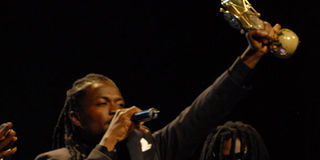How Lucky Dube lives on, three years after death

Luck Dube’s son, Thokozani Dube, receives the Legendary Award on behalf of his father at the MTV Africa Music Awards (MAMAs) held in Nairobi last year. Photo/FILE
Today, the world remembers Lucky Dube. Last year on October 10, the MTV Africa Music Awards (MAMAs), held at the Moi International Sports Centre, set up a Legend award to honour one of Africa’s greatest musicians, Lucky Dube.
As he went on stage to pick it on behalf of his father, Thokozani Dube was overcome by emotion and almost shed tears as he lifted the award.
But the wild cheers from the thousands of fans in the audience kept him strong, and that’s when he realised how much his father was loved by the world, he said in an interview later.
The show’s host, Haiti-born musician Wyclef Jean, asked the audience to observe a moment of silence in memory of Africa’s Bob Marley, as he described him.
“My father was a great musician and family man too. I’m grateful and honoured that Africa can recognise him using this award,” Thokozani said.
Wyclef went ahead to perform one of his compositions together with Kenya’s Nameless and Ghanaian musician Samini, praising Dube’s work and thrilled the audience.
That was almost two years after Lucky Dube was shot dead in front of his family, Thokozani included, in an attempted car-jacking incident.
Three years on, Dube’s songs are still a hit on the international market and he remains a legend. To show how powerful his music is, last year’s winner of Tusker Project Fame reality show, Rwanda’s Alpha Rwirangira, got a clean win after he did a rendition of Dube’s Remember Me.
His 25-year music career was cut short on the night of Thursday, October 18, 2007 as robbers shot him in Rosettenville, Johannesburg, as he dropped off his children at a relative’s house.
His music touched millions around the world, primarily through his 22 recorded albums — in Zulu, English and even Afrikaans — many of which have been record-breakers with phenomenal sales from around the globe.
Born in Ermelo, formerly of the Eastern Transvaal, now of Mpumalanga, on August 3, 1964, Dube started his music career at the age of 18 by joining his cousin’s band, The Love Brothers, which played Zulu pop music known as mbaqanga.
His parents separated before his birth and he was raised by his mother, Sarah, who named him Lucky because she considered his birth fortunate after a number of failed pregnancies. Along with his two siblings, Thandi and Patrick, Dube spent much of his childhood with his grandmother, while his mother relocated to work.
Lucky joined Teal Records (later to become Gallo) as a fresh-faced young Mbaqanga singer in 1982. Five albums later, he found a genre that spoke to his soul and changed the way he viewed the world. This genre was Reggae.
With his long-time sound engineer and best friend Dave Segal, he created some of the most legendary pieces of reggae music ever recorded, including the tracks Prisoner, Taxman, Slave, Victims, Together As One and Respect — all social anthems that garnered him the adoration of the people of his country and the world.
Lucky was an artist that continued to break international barriers and immediately before his death, he had just signed a deal with Warner Music International, securing him album releases of Respect across Europe.
There are very few words that capture the magnitude of Dube’s devastating loss. As a musician, father and husband, Lucky was one of the most charming, respected, selfless and dedicated people. He was survived by his wife Zanele and seven children Bongi, Nonkululeko, Thokozani, Laura, Siyanda, Philani and Melokuhle.
Additional reporting by HILLARY SANG




